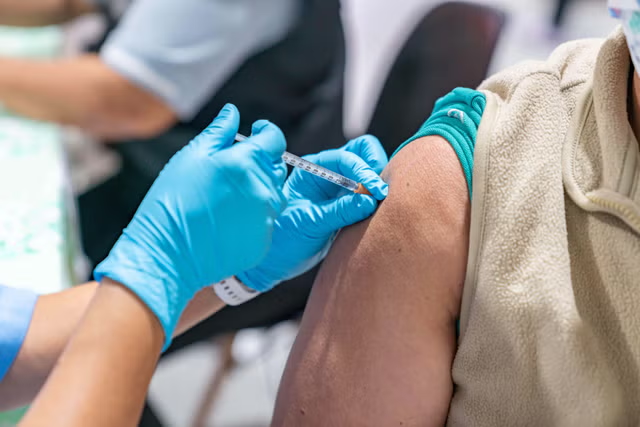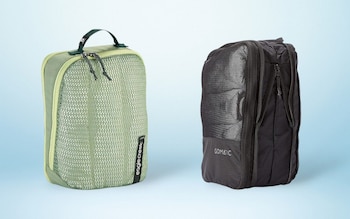Support truly
independent journalism
Support Now
Our mission is to deliver unbiased, fact-based reporting that holds power to account and exposes the truth.
Whether $5 or $50, every contribution counts.
Support us to deliver journalism without an agenda.

Louise Thomas
Editor
A vaccine for respiratory syncytial virus, known as RSV is being rolled out by the NHS.
Respiratory syncytial virus (RSV) is a bug that often does the rounds in schools and offices during the winter months.
While common and usually not severe, RSV can cause some people and babies to become seriously unwell.
This respiratory syncytial virus (RSV) programme was launched on Sunday, September 1 and aims to protect those most at risk of developing serious symptoms.
What is RSV and what causes it?
“Respiratory syncytial virus is a common and contagious virus that primarily targets your respiratory tract,” explains Dr Ashwin Sharma, from online pharmacy MedExpress.

It usually spreads through droplets in coughs and sneezes.
“It is transmitted primarily through respiratory droplets in the air, which can enter the body through the eyes, nose, or mouth,” says Sharma. “Close contact with an infected individual, such as exposure to coughing or sneezing, significantly increases the risk of transmission.
“Additionally, RSV can be spread through direct physical contact, such as handshakes or hugging, as the virus can survive on hands and surfaces for roughly four to seven hours.”
Similar to colds and flu, people are more likely to be infected with RSV during winter.
“RSV is most common during the colder months, typically from November to February when increased indoor activity and closer contact among individuals increase transmission,” adds Sharma.
What are the symptoms of RSV?
People who are infected with RSV usually display mild symptoms similar to a cold.
“Mild symptoms include nasal congestion or cough, sneezing, fatigue and a low-grade fever,” says Sharma.
However, it is important to look out for signs that may indicate a more serious infection.
“If you or someone in your care develops severe shortness of breath, persistent wheezing, unusual confusion, or stops eating or drinking, it’s best to consult a healthcare provider,” advises Sharma. “These symptoms could suggest a need for additional support or treatment.”
While most RSV infections resolve completely within one to two weeks without lasting effects, severe cases can occasionally lead to long-term complications.
“RSV can cause severe respiratory complications in high-risk groups – which includes infants (particularly those under six months or born prematurely), adults over 65, and individuals with chronic lung disease or other underlying health conditions,” says Sharma. “For these populations, RSV may progress to serious complications like pneumonia or hospitalisation.”
Who is eligible for the vaccine?
Babies and seniors are most at risk of complications, so they are the target groups for this new jab.

The vaccine is being offered to pregnant women, from 28 weeks, to protect themselves and their babies, as well as over 75s. A one-off catch-up programme will target those aged 75-79 to ensure older people are protected ahead of winter.
“RSV poses a significant risk to infants and the elderly, populations where the immune system is either underdeveloped or compromised due to age,” explains Sharma. “Babies are particularly vulnerable as their smaller lungs offer limited defence against the virus, which can lead to bronchiolitis (inflammation of the respiratory tract, which can impact breathing).”
In terms of how the vaccine works, Sharma adds: “The RSV vaccine contains a harmless piece of the virus that triggers the body to produce protective antibodies. These antibodies help the immune system to respond more effectively if you become exposed to RSV in the future, which will reduce the severity of the infection.”
How else can you prevent it?
There are also other things you can do to reduce your chances of getting or spreading the virus.

For example, the NHS website encourages people to regularly wash/wipe down toys and surfaces, and to try to avoid touching their eyes, nose or mouth when their hands are not clean. Official guidance also recommends using disposable tissues for sneezes and blowing your nose, and throwing them away as soon as you’ve used them.
Parents are also advised to try to keep newborn babies away from close contact with anyone who has a cold or the flu – especially if they were born prematurely or have serious health conditions.
How is RSV treated?
There’s no specific treatment for an RSV infection, but you can take paracetamol or ibuprofen if you have a high temperature and feel uncomfortable (always check guidance on packaging and speak to your doctor or pharmacist if unsure).
The NHS website also suggests using saline nose drops from a pharmacy if you need help with a blocked nose, and recommends drinking plenty of fluids.
Anyone experiencing serious or worsening symptoms, or signs of breathlessness, should seek medical help urgently.
Disclaimer: The copyright of this article belongs to the original author. Reposting this article is solely for the purpose of information dissemination and does not constitute any investment advice. If there is any infringement, please contact us immediately. We will make corrections or deletions as necessary. Thank you.



